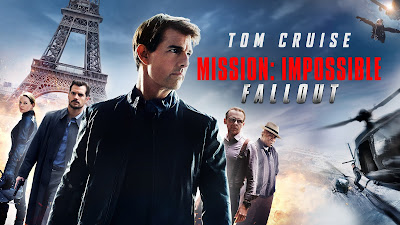All one really needs to know is that Mission: Impossible - Fallout follows the franchise's time-tested formula, so the audience should know exactly what they're getting. However, I'm not sure that the previous films had plots that so lacked internal coherence.
What I find particularly annoying, and there ought to be a name for this, is the phenomenon of having plot twists that are meant to surprise the audience but make little to no sense from the perspective of the characters. It seems indicative of a writer who didn't really have a story to tell but required a finished screenplay. And this is indeed what you get with MI - Fallout: the dialogue between the characters is merely filler that progress us us toward the next action scene, whether that be a fist fight, shoot out, or chase.
There's nothing necessarily wrong with this, especially if one has an appreciation for technical action cinematography. Here at CRN, we are rabid fans of martial arts films, which often have rather forgettable stories to move them along. There is a cost to this, however, and that is the loss of an emotional basis for the action. If the story involves characters we don't care about with generic motivations (such as preventing terrorist attacks by villains who ultimately also have generic motivations or even none specified), then it is difficult to get excited and requires more effort to be entertained. Furthermore, if the characters seem to face little-to-no real risk, such as Tom Cruise with his apparent physical invulnerability and who, even at his age, can walk off a high speed motorcycle accident, then there really is no drama at all.
It reminds me of why I find Superman so boring (coincidentally, Henry Cavill also stars) - he can do everything an dfaces no danger, and is frequently involved in fights with other super beings where seemingly devastating blows are traded yet neither opponent is the worse for wear. I'm also reminded of why I found the original Die Hard more appealing than the later films: John McClane wasn't indestructible. Things like broken glass presented a real obstacle that he had to overcome, making him seem more human than super agent Ethan Hunt.
The one thing I enjoyed most about the film was CNN's role. In one scene, a captured terrorist awakens in a hospital bed to a Wolf Blitzer news report detailing the destruction his terror polot has wrought. He is led to believe he's been in a coma and is promised that Blitzer will read his manifesto on air in exchange for the password to unlock his phone. He agrees, only to find that he's been tricked and his explosives never actually went off. The thing I found interesting about this scene was its reflection of reality: the Cable News Network is fully willing to report propaganda for US intelligence agencies, seeing themselves as the legitimate gatekeepers of what the public is allowed to know. I can tell whether this messaging was intentional or not; regardless, it was the most realistic part of this film.

